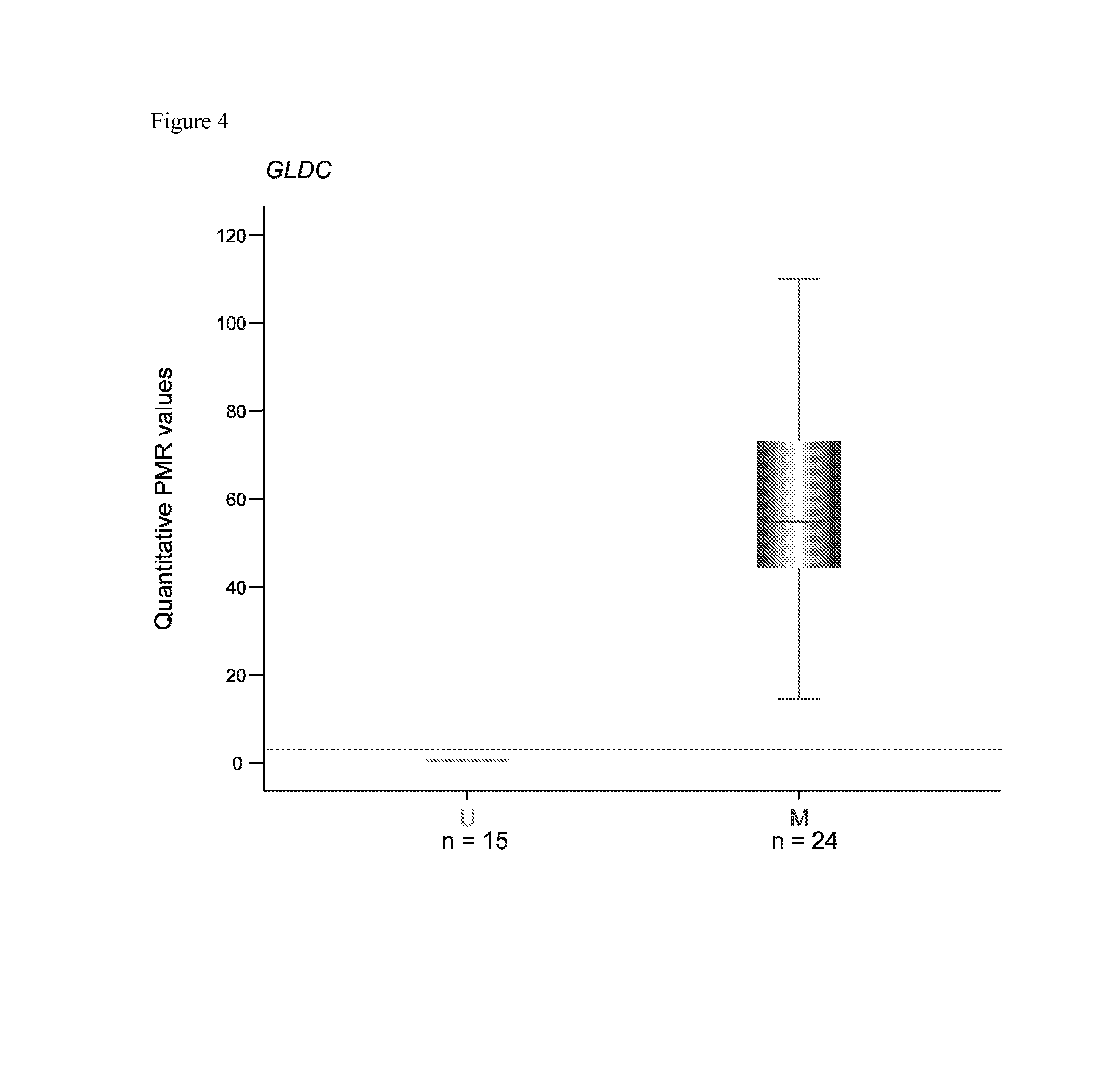Methods and biomarkers for detection of gastrointestinal cancers
a biomarker and cancer technology, applied in combinational chemistry, chemical libraries, libraries, etc., can solve the problems of high mortality, difficult diagnosis, and difficulty in diagnosing cca
- Summary
- Abstract
- Description
- Claims
- Application Information
AI Technical Summary
Benefits of technology
Problems solved by technology
Method used
Image
Examples
example 1
Identification of Novel Epigenetic Biomarkers in Colorectal Cancer, GLDC and PPP1R14A
Materials:
[0094]A panel of twenty colon cancer cell lines was analysed in this project. The panel included eleven microsatellite stable (MSS; ALA, Colo320, EB, FRI, HT29, IS1, IS2, IS3, LS1034, SW480, V9P) and nine microsatellite unstable (MSI; Co115, HCT15, HCT116, LoVo, LS174T, RKO, SW48, TC7, TC71) cell lines, thereby representing both of the phenotypical subgroups of colorectal cancer. Forty-seven primary colorectal carcinoma samples, including 27 MSS and 20 MSI tumours, were subjected to DNA promoter methylation analysis in the present study. Twenty-four of the samples derived from a series which was collected at seven hospitals in the South-Eastern part of Norway from 1987-1989. The remaining 23 samples were collected at Aker University Hospital from 2005-2007. Also included in the present project were 49 normal colorectal mucosa samples derived from deceased colorectal cancer-free individuals...
example 2
Identification of Novel Epigenetic Biomarkers in Gastrointestinal Cancer (Cholangiocarcinomas), CDO1, DCLK1, ZNF33, and ZSCAN
[0105]Cholangiocarcinoma (CCA) is notoriously difficult to diagnose and displays a high mortality due to late clinical presentation. CpG island promoter hypermethylation is associated with cancer development. We aimed to identify novel epigenetic biomarkers with a potential to improve the diagnostic accuracy of CCA. Microarray analyses performed in CCA cell lines were compared with previously published expression profiles in tumors compared to non-malignant controls. Common candidate genes were interrogated for their promoter methylation status in cancer cell lines from the gastrointestinal tract, using a qualitative methylation specific polymerase chain reaction (MSP). Frequently methylated genes were subjected to quantitative methylation specific polymerase chain reaction (qMSP) in two CCA sample series, including fresh frozen (n=34) and formalin-fixed paraf...
PUM
| Property | Measurement | Unit |
|---|---|---|
| Fraction | aaaaa | aaaaa |
| Fraction | aaaaa | aaaaa |
| Fraction | aaaaa | aaaaa |
Abstract
Description
Claims
Application Information
 Login to View More
Login to View More - R&D
- Intellectual Property
- Life Sciences
- Materials
- Tech Scout
- Unparalleled Data Quality
- Higher Quality Content
- 60% Fewer Hallucinations
Browse by: Latest US Patents, China's latest patents, Technical Efficacy Thesaurus, Application Domain, Technology Topic, Popular Technical Reports.
© 2025 PatSnap. All rights reserved.Legal|Privacy policy|Modern Slavery Act Transparency Statement|Sitemap|About US| Contact US: help@patsnap.com



